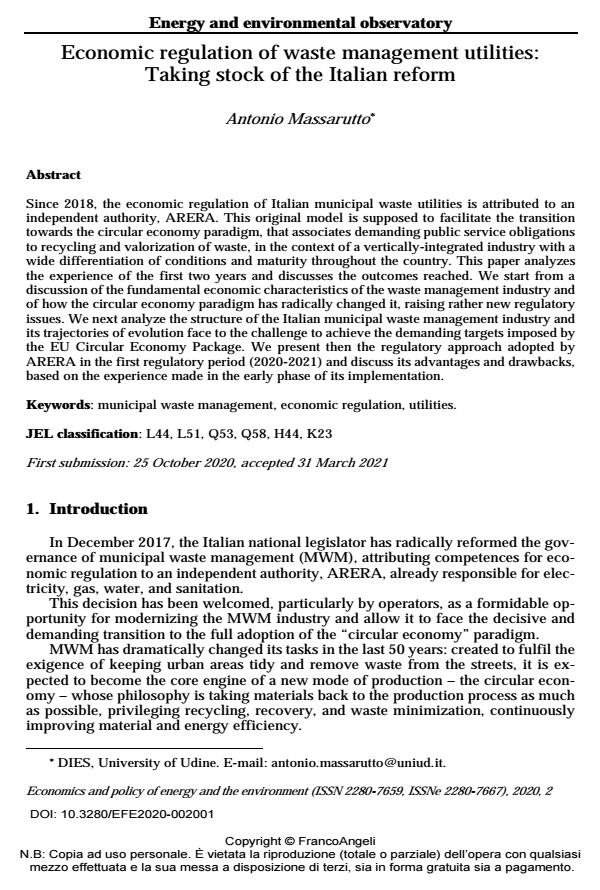Economic regulation of waste management utilities: Taking stock of the Italian reform
Titolo Rivista ECONOMICS AND POLICY OF ENERGY AND THE ENVIRONMENT
Autori/Curatori Antonio Massarutto
Anno di pubblicazione 2021 Fascicolo 2020/2
Lingua Inglese Numero pagine 29 P. 5-33 Dimensione file 317 KB
DOI 10.3280/EFE2020-002001
Il DOI è il codice a barre della proprietà intellettuale: per saperne di più
clicca qui
Qui sotto puoi vedere in anteprima la prima pagina di questo articolo.
Se questo articolo ti interessa, lo puoi acquistare (e scaricare in formato pdf) seguendo le facili indicazioni per acquistare il download credit. Acquista Download Credits per scaricare questo Articolo in formato PDF

FrancoAngeli è membro della Publishers International Linking Association, Inc (PILA), associazione indipendente e non profit per facilitare (attraverso i servizi tecnologici implementati da CrossRef.org) l’accesso degli studiosi ai contenuti digitali nelle pubblicazioni professionali e scientifiche.
Since 2018, the economic regulation of Italian municipal waste utilities is attributed to an inde-pendent authority, ARERA. This original model is supposed to facilitate the transition towards the circular economy paradigm, that associates demanding public service obligations to recy-cling and valorization of waste, in the context of a vertically-integrated industry with a wide differentiation of conditions and maturity throughout the country. This paper analyzes the ex-perience of the first two years and discusses the outcomes reached. We start from a discussion of the fundamental economic characteristics of the waste management industry and of how the circular economy paradigm has radically changed it, raising rather new regulatory issues. We next analyze the structure of the Italian municipal waste management industry and its trajecto-ries of evolution face to the challenge to achieve the demanding targets imposed by the EU Circular Economy Package. We present then the regulatory approach adopted by ARERA in the first regulatory period (2020-2021) and discuss its advantages and drawbacks, based on the experience made in the early phase of its implementation.
Parole chiave:Municipal waste management, economic regulation, utilities
Jel codes:L44, L51, Q53, Q58, H44, K23
Antonio Massarutto, Economic regulation of waste management utilities: Taking stock of the Italian reform in "ECONOMICS AND POLICY OF ENERGY AND THE ENVIRONMENT" 2/2020, pp 5-33, DOI: 10.3280/EFE2020-002001